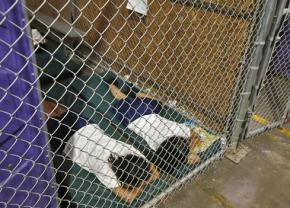Children made victims twice over
, author of No One is Illegal: Fighting Racism and State Violence on the U.S.-Mexico Border, explains the role that U.S. economic pressure and political policies played in the migration of unaccompanied minors from Central America, in an edited version of an article written for the Progressive.
WE NEED to provide refuge for the children arriving from Central America. Sending them back to the countries they are fleeing ignores the current and long-term causes of this migration, and the misbegotten U.S. policies that have helped fuel it.
In recent years, the drug war has flared out of control in Central America. While the majority of drug consumption occurs in the U.S., the bulk of the violence takes place in Central America.
According to the Los Angeles Times, the homicide rate per 100,000 people in Mexico in 2012 was 21.5, while the rate in Guatemala was 39.9, in El Salvador 41.2, and in Honduras a whopping 90.4. (In the United States, it was 4.8.) There has also been a spike across the board in the number of children killed in this violence.
Since 2010, the Obama administration has funded the Central America Regional Security Initiative to arm allied Central American governments to suppress the drug trade. To date, this initiative has provided nearly $1 billion in military equipment, training and support to fight the war, but has only increased internal violence without stopping drugs or the cartels. Homicide rates have increased nearly 100 percent since its implementation.

Cartels and criminal gangs have grown by recruiting or forcing displaced youth into their ranks. The fear of this conscription--along with the desire to reunite with family and to find work and security--explains the surge of youth fleeing to the U.S. in recent months.
But youth migration from this region is not new. Successive generations have come from Guatemala, El Salvador and Honduras, where large populations have been displaced by conflicts and failed policies.
Migrants fled during the civil wars of the 1980s, which resulted from deep inequality and extreme poverty. Small oligarchies owned the land and kept national wealth within their families. These oligarchies were kept in power by the military, which the U.S. supported.
Under the guise of the Cold War, successive U.S. administrations provided more than $1 billion of aid to these repressive governments. The United Nations estimates that 75,000 people were killed in El Salvador and more than 200,000 in Guatemala, as the militaries conducted "dirty wars" against their own people.
In the aftermath of the civil wars, the U.S. has imposed "free trade" policies on Central America. This has flooded these much smaller economies with U.S. imports, which have displaced farmers and workers, while enriching foreign corporations and local elites. With the implementation of the Central American and Dominican Republic Free Trade Agreement in 2006, economic distress has accelerated.
As a result, hundreds of thousands of small farming families and urban poor have been pushed to migrate north to find work.
We can't detach this history from the arrival of Central American refugees to the U.S. We shouldn't send these children back to a violent fate. We should welcome them with open arms.
A previous version of this article was published at the Progressive.


